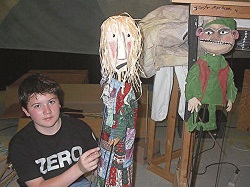
 |
||
About Articles Quotes Editor's Blog |
||
|
Unschooled Teens Learning On The Job
|
 Fourteen-year-old Zach as a working puppeteer, learning job and social skills, and earning money. |
Other parents often ask me, “How do you coordinate the transportation for all of this?” Luckily, Chris doesn’t live too far from us and we can meet half way or many times he just picks Zach up and brings him home. When Zach worked on a different show with many rehearsals, at a location that was about 30 minutes away, he would take the Amtrak train home. It was cheap and we live just blocks from the station. We would drop him off in the city in the morning and he would be home most days before we were.
He has learned so much from working and performing. He has had to work sick once and tired many times. He fields many questions and loves to show off the puppets after the show. One day, a class of children who are blind came to a performance. Zach and the other puppeteers let the students touch the puppets as they described them. Then Paul did the voices so they could hear and feel. The students loved the show and were so glad that Zach and the others had taken the time to show them each character. Zach enjoyed helping the students to visualize the characters and hearing them laugh during the show.
The question I’m often asked at the shows is, “How does he get out of school to do this?” When I say that we homeschool, people usually remark about how lucky he is to be so flexible in his schedule. And he is. Working for us allows him to be very flexible and that way he can still make some spending money even when he doesn’t have any puppet shows that week. He likes doing demolition, drywall, painting, and prep of all kinds and doesn’t even mind doing clean-up. He is quite self motivated, conscientious, and pays attention to detail.
He enjoys working alongside us and learning useful skills. Talk about your practical math! Anyone that has ever hung drywall can tell you there is much math involved in that process. There is a lot of measuring twice and cutting once. He also has to read directions, help make lists, and remember which way to loosen screws and which way to tighten. He knows all the tools by name and can get them to his Dad or I quickly, which is great.
So what does a teen who makes money do with it? Well, Zach saves most of his. He looks at furniture for his room and lots of instruments. He does buy an occasional book or CD or take his girlfriend, Ida, to the movies. But the most amazing thing he has done so far is paid his own way to go to Hawaii with his best friend’s family. He had an amazing two week trip that he’ll never forget. And isn’t traveling the best way to learn geography?
* * * *
What Else You Need to Know:
Laws regarding youth employment vary widely so check with your state or provincial labor authority, Often, children younger than 14 are restricted to jobs like delivering newspapers, working in a non-hazardous business owned by a parent, baby-sitting, or performing on stage, screen or radio. The type of job and hours of work allowed change as the worker gets older. The National Consumers League has pegged these jobs as the most dangerous for kids:
• Delivery and other driving: including operating or riding on forklifts and other motorized equipment.
• Working alone in cash-based businesses such as convenience stores, gasoline stations and fast-food establishments.
• Traveling youth crews: selling candy, magazine subscriptions, and other consumer goods on street corners, in strange neighborhoods, etc.
• Cooking: exposure to hot oil and grease, hot water and steam and hot cooking surfaces.
• Construction: including work at heights and contact with electrical power.
Resources:
The Young Entrepreneur’s Guide to Starting and Running a Business by Steve Mariotti (Times Books, 2000)
Whiz Teens in Business by Danielle Vallee (Truman Publishing, 1999)
The Kid’s Guide to Money: Earning It, Saving It, Spending It, Growing It, Sharing It by Steve Otfinoski (Scholastic,
1996)
Jane Van Benthusen led the Free Range Learners unschooling Support group, which is a special interest group within the L.E.A.R.N. (Let Education Always Remain Natural) secular homeschooling support group in Kansas City, Missouri. This article was published in Life Learning Magazine in 2004.